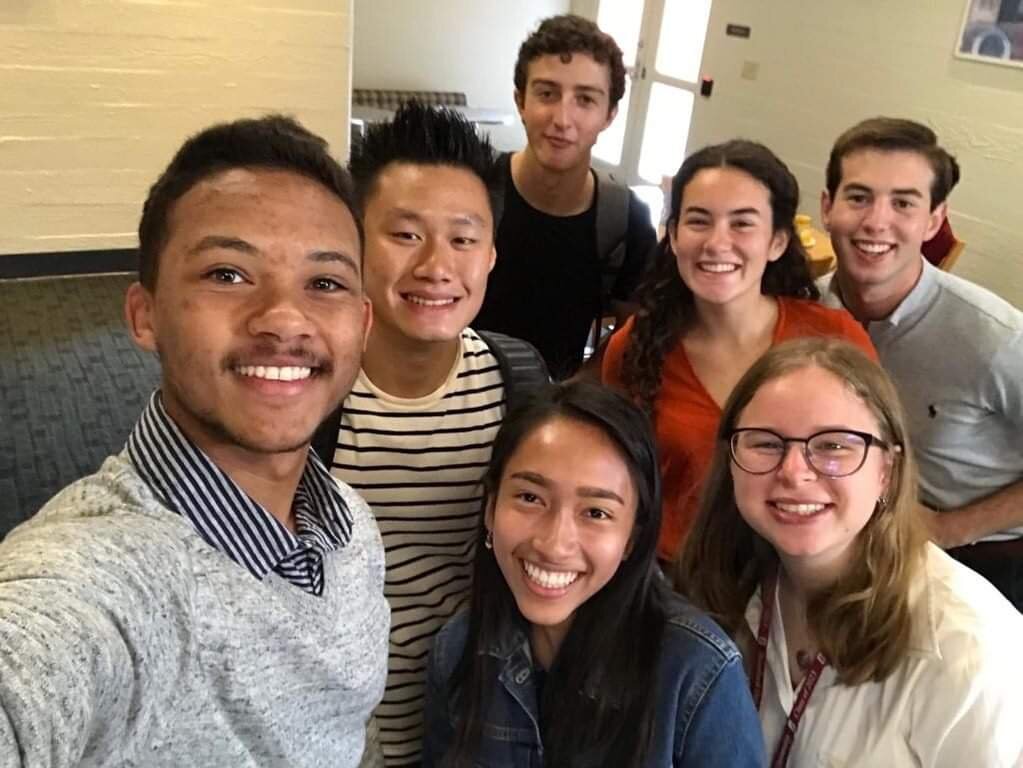Mariia Smyk, a Kyiv native, was looking forward to starting her second year of studies at one of the most prestigious universities in the United States, the Massachusetts Institute of Technology.
Now, she is at risk of deportation. Due to a new directive from President Donald J. Trump, the U.S. government will require international students whose schools moved their courses online due to the COVID-19 pandemic to leave the country.
“I came to the U.S. to study and to then apply my knowledge in Ukraine. I am studying mechanical engineering and energy systems, and I want to reform the Ukrainian energy sector,” she told the Kyiv Post. “How can I focus on learning when I am under a constant threat of being deported for nothing but a wish to study?”
Smyk is just one of over a million international students in the U.S. who now find themselves in limbo.
Ukrainians are just a small portion of those students but they are tight-knit. In interviews with students, the Kyiv Post found that almost everyone has been impacted by the directive or knows someone who has.
Now they face a difficult decision: head home to avoid deportation or transfer to another school.
American education
In a controversial move announced on July 6, the United States Immigration and Customs Enforcement revised their student visa policy to not allow international students to remain in the United States if their degree program has been moved online in the fall semester.
As of 2019, there are believed to be 1,095,299 international students in the U.S., where they make up 5.5% of all students at American universities. Roughly half are from India and China.
Ukrainian students are relatively few. According to the Ukrainian think tank CEDOS, during the 2016-2017 academic year there were an estimated 1,817 Ukrainian nationals studying in the country. But they are no more immune to the new rules than any others.
Unless Ukrainian students have in-person classes at their U.S. colleges, they will be asked to find alternative arrangements, such as attending a different university. For those who cannot do that, ICE has stated that they must leave the country under the threat of deportation.
According to the Chronicle of Higher Education, 9% of U.S. universities will deliver their classes online during the fall term. It remains to be seen whether universities will change their plans due to the impact on foreign students. Universities moving online include the prestigious Georgetown, Harvard and Rice.

Marta Baziuk, a student from Ternopyl, was looking forward to starting classes at Princeton this fall but her hopes may be dashed by the new directive. Only legal action by multiple universities and the state of California might stave off her deportation. (Marta Baziuk)
Ukrainians in limbo
Marta Baziuk, a Ukrainian student from Ternopil, was looking forward to starting her classes at Princeton this fall. Following the July 6 directive, she is uncertain what she will do.
“After graduating from high school earlier this year, I stayed in the U.S. to ensure that I would be able to maintain my student visa status and start my classes in Princeton this fall,” she told the Kyiv Post. “On July 6, I received an email from Princeton saying that freshmen are welcome to live on campus this fall, which would be a great relief for me. However, with the July 6 directive, if Princeton does not offer any in-person classes for freshmen, I do risk deportation, since I’m currently staying with a host family in the U.S.”
Baziuk says the new visa rules have caused her stress and emotional distress.
“I am definitely worried that, in case I have to leave the U.S., it will be impossible to come back in any near future, especially since coronavirus is not going anywhere yet,” she said.
Princeton has kept international students informed and has supported them by submitting an amicus brief in a lawsuit filed by Harvard and MIT against ICE and the U.S. Department of Homeland Security challenging the directive.
“We will pursue this case vigorously so that our international students — and international students at institutions across the country — can continue their studies without the threat of deportation,” Lawrence S. Bacow, the president of Harvard, said on July 8.
Like many other students, Baziuk told the Kyiv Post that she is pinning her hopes on that lawsuit.
MIT student Smyk finds herself in an equally difficult position. Back in March, when her university went fully online, she was not granted an exception by the administration to stay on campus. As a result, she had to move in with a friend in Los Angeles.
“I knew that if I left the country then, I would most likely not be able to return to the U.S. for the following year since my visa stamp was expiring in June 2020 and all of the U.S. embassies were closing for an indefinite period of time,” she told the Kyiv Post.
The new rules have made her predicament even more difficult.
“It’s been an extremely stressful week for me and thousands of other international students,” she said. “When ICE announced the new changes, my Facebook messenger was flooded with discussions of the potential implications for the student body.”
Now, her future is largely dependent on the decisions of other people.
“While MIT is adopting a hybrid model until Thanksgiving, I might be able to stay on campus until then and continue to study,” she said. “However, MIT also announced that they’re going fully online after Thanksgiving, which, according to the ICE updates, means that I am no longer allowed to be in the U.S.”
During the COVID-19 pandemic, Ukrainian students in the U.S. have come to rely heavily on support networks and student organizations to provide temporary accommodations. But Smyk said the university administration had remained largely silent on the issue.
“MIT has not shared any information about ICE’s decision,” she said. “I’ve received a lot of support from my fellow students, faculty, research supervisor and several departments at MIT, who will support our international student body as much as possible.”

Ukrainian student Anastasiia Malenko poses for a camera with some of her fellow students at Stanford University. Over a million foreign students study in the U.S. and many are at risk of deportation under the new rules. (Anastasiia Malenko)
Many students remained on their respective campuses during the Coronavirus pandemic, hoping to preserve their visa status in anticipation of the resumption of classes in September. Anastasiia Malenko, a student at Stanford University, stated that, if the lawsuit is not successful, she will risk deportation after having previously been stuck on an empty campus with enforced isolation.
Many Ukrainian students rely upon host families to provide them with lodgings during the coronavirus lockdown. Baziuk was lucky to have a host family in the U.S. from when she participated in FLEX, an exchange program for high school students.
“But some of my friends who stayed on campus during the pandemic had to leave the U.S. earlier this year,” she said.
For many Ukrainians, this is not just distressing but costly as well.
“Getting a plane ticket to Ukraine is also very expensive for my family, so I would request assistance from Princeton,” Baziuk said.
Students returning from the U.S. will also be subject to 14 days of self-isolation, as the U.S is listed as a “red” country with a higher incidence of coronavirus than Ukraine. Students interviewed by the Kyiv Post said they are afraid of contracting the virus while traveling home to Ukraine and worry about infecting their family members.
As of July 10, the state of California has followed MIT and Harvard’s lead, attempting to sue the Trump administration over its visa policy.
This is not the first time the Trump administration has caused outrage due to unexpected changes to U.S immigration policy. The so-called “Muslim Ban,” an executive order issued in 2016 after Trump took office, revoked up to 60,000 visas, many of which belonged to foreign students who were returning from trips abroad.
The rule change will also pose a challenge for the universities.
In April, the Inside Higher Ed news site reported that U.S colleges risk losing up to 20% of their students due to the COVID-19 pandemic. The loss of international students from major American universities is likely to make their financial situation even worse.
